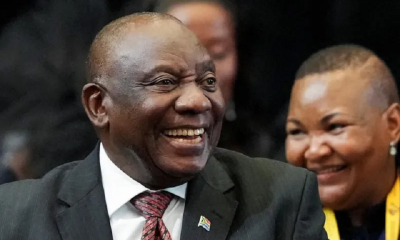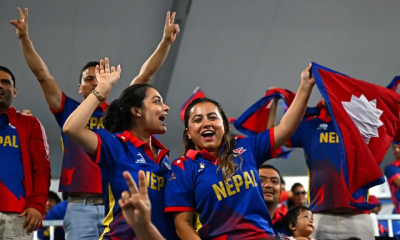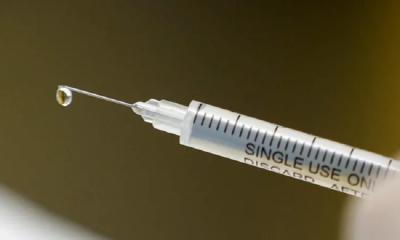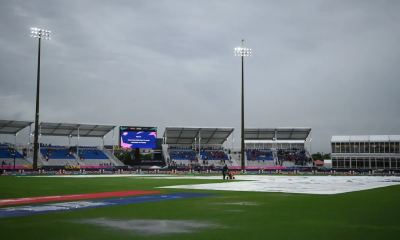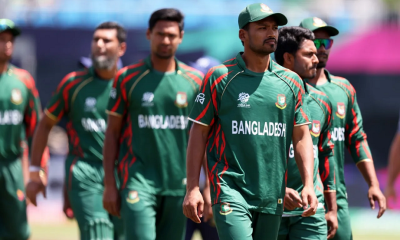Foreign News
South Africa leader under pressure after election blow

South Africa’s President Cyril Ramaphosa is under growing pressure after leading the ruling African National Congress (ANC) to its worst election result in 30 years, forcing it to share power.
With votes in from most districts, the ANC is on 40% – down from 58% at the previous election. This is lower than the party’s feared worse-case scenario of 45%, analysts say, The ANC has always polled above 50% since the country’s first democratic elections in 1994, which saw Nelson Mandela become president.
But support for the party has been dropping significantly due to anger over high levels of corruption, unemployment and crime.
Citing the cost-of-living crisis and frequent power-cuts, a woman told the BBC she ended a 30 year voting streak for the ANC in favour of the centre-right Democratic Alliance (DA) this time.
“This result is not good. I wanted it out of government. We need to give someone else a chance,” she said
The final results will be announced at 18:00 local time (17:00 BST) on Sunday, the BBC understands.
The ANC leadership has begun to consult internally to prepare for complex coalition talks.
Its options are the DA, which is in second place on 22%, the uMkhonto we Sizwe (MK) party led by former President Jacob Zuma, on 15%, or the radical Economic Freedom Fighters (EFF) with 9%.
Both the EFF and MK advocate seizing white-owned land and nationalising the country’s mines.
The MK has said it would be prepared to work with the ANC, but not while it was led by Mr Ramaphosa.
He replaced Mr Zuma as both president and ANC leader following a bitter power struggle in 2018.
MK supporters have been celebrating overnight in Durban, the biggest city in the party’s heartland of KwaZulu-Natal province. The party was only formed in December.
ANC chairperson Gwede Mantashe said his party was unlikely to form an alliance with the DA. He said there would have to be “policy alignment” between parties to form a coalition agreement.
For the ANC, its black empowerment policies – aimed at giving black people a stake in the economy following their exclusion during the racist apartheid era – were “non-negotiable”.
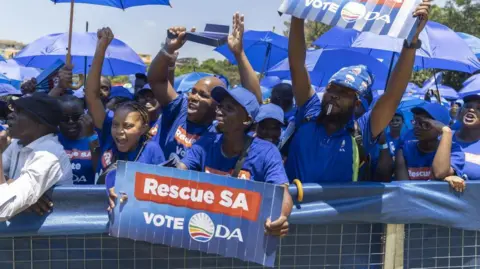
He added that any coalition partner would have to agree to the National Health Insurance (NHI) Bill, which promises universal health care for all, signed into law earlier this month.
The DA opposes both the NHI and the ANC’s black empowerment policies.
Despite the ANC’s reluctance to align with the DA, its leader John Steenhuisen hasn’t ruled out the idea.
Bit if an alliance with the ANC was reached there would be a few non-negotiables, he said. “Respect for the rule of law and the constitution, a social market economy that treats the private sector as partners in the growth agenda.”Zero tolerance for corruption and cadre deployment, and an absolute laser-like focus on economic policies that grow jobs.”
Mr Steenhuisen also told the BBC he would have to consult pre-election coalition partners before considering any negotiations. But he ruled out the EFF and the MK party as potential coalition partners. “I think instability is not in the best interest of the country. A coalition with the radical left in South Africa of the MK party and the EFF will produce the same policies that destroyed Zimbabwe, destroyed Venezuela,” he said.
Another option would be to work with the EFF, led by Julius Malema, a former ANC youth leader. The two parties currently form the coalition that runs the country’s biggest city, Johannesburg.
A record 70 parties and 11 independents were running, with South Africans voting for a new parliament and nine provincial legislatures.
The DA has signed a pact with 10 of them, agreeing to form a coalition government if they get enough votes to dislodge the ANC from power. But this does not include the EFF or MK, who would be needed to form a majority.
As the parties scramble to form alliances, Kenya’s former President Uhuru Kenyatta, who is leading the African Union election observer mission in South Africa, offered some advice for forming coalitions.
He said coalition governments need to focus on areas of agreement instead of differences.
“I can only wish them well and hope that the leadership will take this decision by the people in a positive frame,” he said.
(BBC)
Foreign News
‘Notorious Tanzanian drug trafficker’ arrested during raid in Zambia
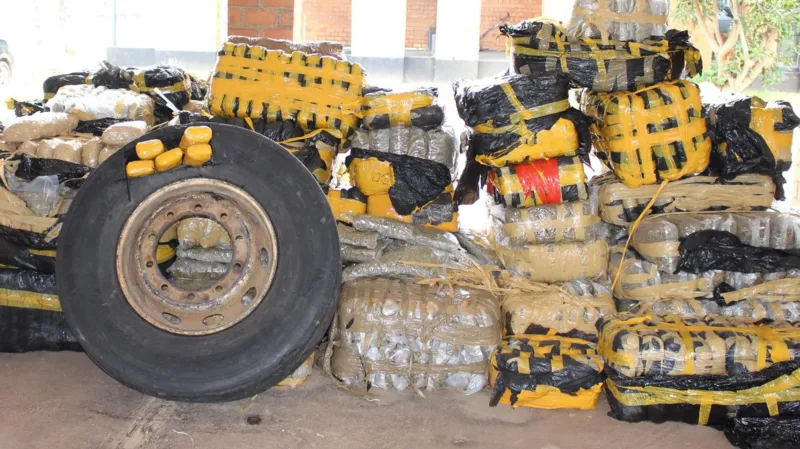
A “notorious” Tanzanian drug-trafficking kingpin has been arrested in Zambia during a raid, the Zambian Drug Enforcement Commission (DEC) has announced.
Ahmed Muharram was among several suspects detained in Zambia’s capital, Lusaka, along with large quantities of marijuana and cough syrup containing codeine in several drug busts on Tuesday, the authorities said.
“The suspect is a known transnational drug trafficker,” the DEC said, adding that the 40-year-old had long been on the anti-drug agency’s watch-list.
The arrest of Muharram, who has not yet commented, was made possible thanks to a series of intelligence-led operations, the agency said.
Under Zambian law, marijuana is classed as a dangerous drug and is illegal to possess.
The trafficking, possession and use of illegal drugs such as cannabis is punishable by a fine or a prison sentence.
The southern Africa country struggles with drug abuse and trafficking, especially cannabis and heroin.
During Tuesday’s operations, the DEC said it had seized 221.2kg of cannabis hidden in a lorry in Lusaka’s Lilayi area.
The search was extended to Muharram’s residence in Lilayi, where officers discovered an additional 1,159.6kg of “high-grade” cannabis, bringing the total seizure to 1,380.8kg, the agency added.
A Zambian national who was also arrested is believed to be an accomplice in the organised drug-trafficking scheme.
The DEC said their operations also saw the arrests of:
- A Zambian national for trafficking 55 boxes of Benylin containing codeine in Lusaka
- Two other Zambians for trafficking cannabis concealed in their vehicle
- Two Burundian nationals in the southern district of Chirundu for trafficking cannabis in separate vehicles: some was hidden inside a spare lorry tyre, some in gas compressors and additional cannabis was mixed with sugar, salt and paint and concealed in tins and buckets of paint.
“All suspects have since been detained in lawful custody and will appear in court soon,” DEC said in a statement.
The agency said it was committed to ensuring that Zambia was neither used as a corridor nor a destination for drug trafficking.
[BBC]
Foreign News
Fearing Russia will seize her town, war widow moves husband’s grave to Kyiv

The quiet of a Kyiv cemetery is broken by a trumpet salute, then a burst of rifle fire.
Soldiers stretch a Ukrainian flag over a shiny wooden coffin and stand silently alongside in the sparkling white snow. A woman cries, her face crumpling.
Natalia is burying her husband for the second time.
Vitaly was killed three years ago fighting in the eastern Donbas and his first grave was in their home town of Slovyansk. But Russian forces have advanced since then and the area is increasingly under attack.
So Natalia had her husband’s grave exhumed and Vitaly’s remains moved hundreds of miles to Ukraine’s capital.
“When we buried him in Slovyansk, land was being liberated and we thought the war would soon end,” Natalia explains, after the reburial ceremony conducted with military honours. “But the frontline is constantly moving closer and I was scared Vitaly might end up under occupation.”
Vitaly was a ceramics artist who volunteered to defend his country in the early days of Russia’s full-scale invasion in 2022.
“He didn’t want to, but he had do it. He was a patriot,” Natalia explains, through her tears. She was pregnant when her husband was killed and he never got to meet their daughter.
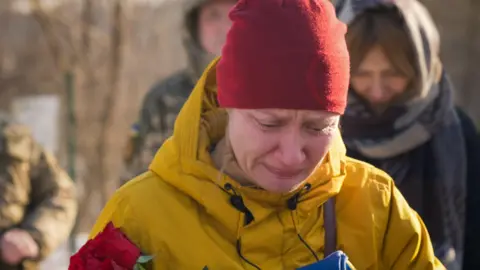
The decision to move Vitaly’s body from the land where he was born and fought was extremely painful.
“It was very hard, emotionally. But it was the right decision,” Natalia is sure. “It would have been far harder to leave him, to know that he had stayed.”
Ukrainians are facing unimaginable choices now as the US tries to broker a peace deal between Moscow and Kyiv, but Russia pushes on with its invasion.
That includes massive aerial attacks against Ukraine’s energy system, against all rules of war.
Meanwhile, the most pressure for compromise is on Kyiv.
At some point, the US-led talks will hone in on the most sensitive issue of all: the status of land in the eastern Donbas region that so many men have died defending.
Ukraine still controls around a fifth of the area, including Slovyansk. But the town is close to the current frontline where Russian forces have been trying to push forward for months.
Kyiv proposes freezing the fighting there, ceding nothing more. But Moscow wants to be handed control over the rest of the region and the US is thought to agree.
That is far from Vladimir Putin’s original plan to take over all Ukraine – to “denazify” and “demilitarise” as he snarled at the time. But it would allow him to claim a victory for Russia of sorts.
“There are drones in the streets, hitting minibuses, and glide bombs fall in the city centre, leaving craters,” Natalia says, describing life in Slovyansk now, where her husband had been buried.
“A few months ago, the attacks were weekly. Now it’s every couple of days.”
North of Natalia’s hometown, up around the city of Kharkiv, there are more signs that the danger zone is spreading.
Workmen hammer stakes into the frozen ground to fit nets which they’ll then stretch over the road in a canopy as protection against Russian drones.
Not far away, in an unmarked spot, we visited a workshop for Ukraine’s own UAVs.
The soldiers of the Typhoon unit work in a basement filled with heaps of kit and cables, reached via a handmade wooden staircase. The men are responsible for repairing drones damaged at the frontline and for innovation: Ukraine needs every chance against an enemy with more men and more resources.
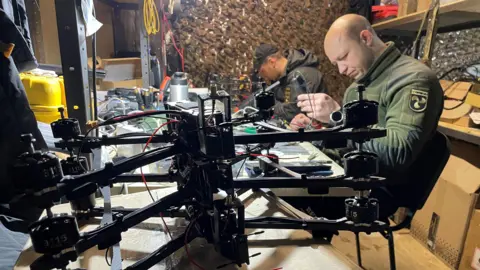
The music playing as the team work is chirpy French pop, but the soldiers’ mood is mixed.
“We try not to discuss it here,” 29-year old Roman replies, when I ask about giving up territory in return for peace. “People quarrel and we don’t need that right now. We need to unite, and fight the Russians.”
Roman lost “a lot of guys”, he says, during his two years in the infantry, fighting in the Donbas.
No surprise that it’s far harder to recruit these days. Last month the country’s defence minister revealed that a staggering 200,000 soldiers were absent without leave.
But like many Ukrainians, Roman is sure that gifting the Donbas to Putin would not make Ukraine secure.
“The Russians will only come back for more,” he says.
Hunched over a laptop in the back room, another soldier admits that “victory” in this war looks very different these days.
“I would say our victory is in preserving our statehood,” Maksym argues, choosing his words carefully. “Even if we have three square kilometres of land, but we keep our constitution and our institutions, then this is still Ukraine.”
He thinks the soldiers should fight on, regardless.
“Russia is 10 times our size. But still we can’t surrender.”
Back in Kyiv, Natalia clings to the arm of a friend, as grave diggers shovel fresh earth onto her husband’s coffin then slot a wooden cross into place on top.
A photograph of Vitaly shows him smiling, posing beside a yellow sunflower.
Natalia is relieved to have her husband close again where she and their daughter, Vitalina, can visit his grave safely.
“She watches videos of him, looks at photos and she loves him very much even though they never met,” Natalia smiles.
She also hopes to tell her husband soon that she’s pregnant using the sperm the couple had frozen specially at a clinic, just a few days before Vitaliy was killed.
Many soldiers now do the same before heading for the front.
It’s a brutal fact, but Natalia says none of Vitaliy’s soldier friends made it to his reburial, because so many of them, too, are now dead.
Ukraine has paid an immense price already for four years of all-out war.
Ceding land to Russia that it already controls is one thing: an option now quietly accepted by many.
But Natalia can’t bear the thought of Russia taking more territory, including the town where she and Vitaly lived and were in love.
She has “no doubt” her husband would have wanted the army to fight on, not concede now.
“Russia may pause for a year, then there will be another breakthrough and they’ll be in Kharkiv,” Natalia says.
“I just don’t believe Russia will stop.”
[BBC]
Foreign News
China executes four more Myanmar mafia members
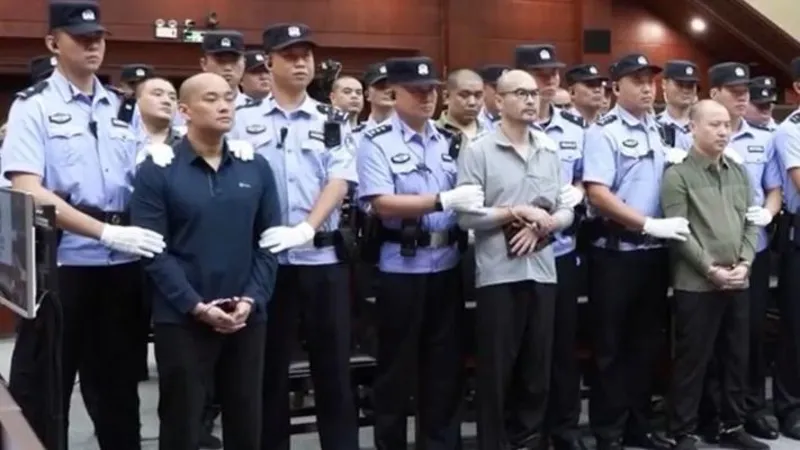
China has executed four members of the Bai family mafia, one of the notorious dynasties that ran scam centres in Myanmar, state media report.
They were among 21 of the family’s members and associates who were convicted of fraud, homicide, injury and other crimes by a court in Guangdong province.
Last November the court sentenced five of them to death including the clan’s patriarch Bai Suocheng, who died of illness after his conviction, state media reported.
Last week, China executed 11 members of the Ming family mafia as part of its crackdown on scam operations in South East Asia that have entrapped thousands of Chinese victims.
For years, the Bais, Mings and several other families dominated Myanmar’s border town of Laukkaing, where they ran casinos, red-light districts and cyberscam operations.
Among the clans, the Bais were “number one”, Bai Suocheng’s son previously told state media after he was detained.
The Bais, who controlled their own militia, established 41 compounds to house cyberscam activities and casinos, authorities said. Within the walls of those compounds was a culture of violence, where beatings and torture were routine.
The Bai family’s criminal activities led to the deaths of six Chinese citizens, the suicide of one person and multiple injuries, the court said.
The Bais rose to power in Laukkaing in the early 2000s after the town’s then warlord was ousted in a military operation led by Min Aung Hlaing – who now leads Myanmar’s military government.
The military leader had been looking for co-operative allies, and Bai Suocheng – then a deputy of the warlord – fitted the bill.
But the families’ empires crashed in 2023, when Beijing became frustrated by the Myanmar military’s inaction on the scam operations and tacitly backed an offensive by ethnic insurgents in the area, which marked a turning point in Myanmar’s civil war.
That led to the capture of the scam mafias and their members were handed to Beijing.
In China, they became subjects of state documentaries which emphasised Chinese authorities’ resolve to eradicate the scam networks.
With these recent executions Beijing appears to be sending a message of deterrence to would-be scammers.
Hundreds of thousands of people have been trafficked to run online scams in Myanmar and elsewhere in South East Asia, according to estimates by the United Nations.
Among them are thousands of Chinese people, and their victims who they swindle billions of dollars from are mainly Chinese as well.
(BBC)
-

 Opinion6 days ago
Opinion6 days agoSri Lanka, the Stars,and statesmen
-

 Business5 days ago
Business5 days agoHayleys Mobility ushering in a new era of premium sustainable mobility
-

 Business2 days ago
Business2 days agoSLIM-Kantar People’s Awards 2026 to recognise Sri Lanka’s most trusted brands and personalities
-

 Business5 days ago
Business5 days agoAdvice Lab unveils new 13,000+ sqft office, marking major expansion in financial services BPO to Australia
-

 Business5 days ago
Business5 days agoArpico NextGen Mattress gains recognition for innovation
-

 Business4 days ago
Business4 days agoAltair issues over 100+ title deeds post ownership change
-

 Business4 days ago
Business4 days agoSri Lanka opens first country pavilion at London exhibition
-

 Editorial5 days ago
Editorial5 days agoGovt. provoking TUs




